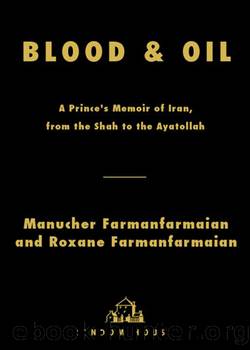Blood & Oil by Manucher Farmanfarmaian

Author:Manucher Farmanfarmaian
Language: eng
Format: epub
Tags: Nonfiction
ISBN: 9780307430717
Publisher: Random House Publishing Group
Published: 2007-12-18T00:00:00+00:00
As fall approached, Razmaraâs hold on the country became increasingly unsure. His ministers lost confidence, and Mohsen Khan even tried to resign. Pressure from Britain, the United States, and the Soviet Union was mounting. All pretense of postwar friendship among them had expired. The United States, clothed in the silks of the UN, was in an all-out war in Korea. Moscow, meanwhile, decided to make noises toward us about trade and political conciliation. Razmara, seeing little warmth or money coming from either Britain or America, decided to make good on his promise to the Russians.
One evening I was dining at the home of my brother General Mohammad Hossein Mirza. He lived downtown on a small slice of ground left over from the old compound. A stupendous Qajar frieze of warriors on horseback going into battle ran the length of the dining room wall. Carpets covered every inch of the floor, many of them overlapping as was customary in old Persian houses. In the middle of the meal the telephone rang and my brother excused himself from the table. He returned with the news that a general had been seen pulling up to the main prison in an army truck with the authority to release all the important Communist prisoners. From there the prisoners had disappeared. Clearly the Soviet Embassy had been primed; its massively padlocked doors had been opened a crack for them to slip through, then shut again with a bang. Although Razmara was already calling for an investigation and threatening to punish those whoâd allowed the escape, it was obvious who had ordered the operation.
Keeping the promise paid off. Two months later, in November 1950, the Russians signed a trade agreement with Iran.
Washington considered the British more than a little to blame. Their stinginess vis-Ã -vis AIOC, argued McGhee on a trip to London just two months earlier, was putting unnecessary strain on Iran and encouraging it to look favorably toward its Communist neighbor. The United States wanted stabilityâas the best defense against communismâand AIOCâs behavior was not helping. To pressure Tehran into approving the Supplemental Agreement, the British government was even withholding a loan of $25 million pegged for Iran by the multilateral Eximbank. The United States wanted the loan to go through so that Iran could start reaping the rewards of investmentâand by association feel good about the West. In addition, said McGhee, it was obvious that the oil company could improve its terms while still enjoying enormous profits.
Sir William Fraser was hardly more cordial to McGhee than he had been to us Iranians. Unmoved by McGheeâs oil background or position, he even went so far as to suggest that Whitehall encourage Washington to get rid of him. Like a lighthouse programmed to send out only one message, he told the undersecretary, âOne penny more and the company goes broke.â
âIt can only be concluded,â wrote Ambassador Grady to Dean Acheson, U.S. secretary of state, âthat the UK is bent on sabotaging our efforts to strengthen Iran [in order] to preserve its [own] dubious supremacy and control there.
Download
This site does not store any files on its server. We only index and link to content provided by other sites. Please contact the content providers to delete copyright contents if any and email us, we'll remove relevant links or contents immediately.
Cannibal Jack by Trevor Bentley(129)
Hanging Ned Kelly by Michael Adams(126)
The Confession of a Fool by August Strindberg(126)
After the Annex by Bas von Benda-Beckmann(121)
Blood & Oil by Manucher Farmanfarmaian(107)
Elizabeth & John: The Macarthurs of Elizabeth Farm by Alan Atkinson(96)
Girl in the Tunnel by Maureen Sullivan(91)
Roger Williams's Little Book Of Virtues by Becky Garrison(88)
The Richest Soil Grows the Deepest Roots: Life in Platte County's Missouri River Bottoms by Helen Ruth Poss Marr(87)
American Slavery as It is: Testimonies by Theodore Dwight Weld(86)
In Stalin's Secret Service by W/ G. Krivitsky(86)
Sixty Years in Southern California, 1853-1913 by Harris Newmark(85)
Great American Catholic Eulogies by Carol DeChant(84)
A Burmese Heart by Y.M.V. Han(81)
106-111-Van Loon by DavidU(81)
A Monastic Landscape by Breda Lynch(71)
Adventures in Lithuanian Genealogy by Sheriene Saadati(71)
Free Trade's First Missionary by Philip Bowring(60)
Rossa's Recollections, 1838 to 1898 by Jeremiah O'Donovan Rossa(59)
